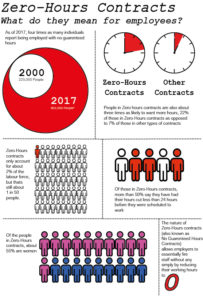22 May More than 50% on Zero-Hours contracts report work cancelled less then a day before scheduled
According to a study by the TUC (Trades Union Congress), more then 50% of workers employed in so called NGHC’s (no guaranteed hours contracts, also known as Zero-hours contracts) have had hours that were scheduled for them cancelled.
But what are Zero-Hours contracts, and how do they compare with conventional salaried contracts.
The ONS (Office for National Statistics) has no solid definition of what constitutes a Zero-Hours contract, but its yearly Labour Force Survey includes it as an option for a contract in which no set hours are guaranteed per week.
This type of employment has been steadily rising in popularity since 2000, and the number of people working in such contracts has increased from 225,000 in the year 2000 to 902,000 in 2017.
The largest user of zero hours contracts is the admin and support industry, including ride sharing and food delivery apps.
These businesses account for about 23% of zero hours contracts as of the most recent data (November 2017).
For some people, zero hours contracts are a flexible way to work around a busy schedule. They are also more recently in wider use by the aging community, who see such contracts as a way to work more on their terms.
However, there is a dark side to zero hours contracts too.
More then half of those employed in zero hours contracts are women, which may act as some context for the gender pay gap as those in zero hours contracts earn an average of £7.70 per hour compared to £11.80 per hour earned by those in a conventional contract.
As well as this, only 12% of Zero-Hours workers report having sick pay available to them, whilst 43% report not receiving holiday pay.
Additionally, 47% report not being given written terms and conditions for their employment.
All of these benefits are guaranteed under legislation, meaning companies that refuse to provide them to employees are breaking the law.
The real-world implications of these numbers can be devastating in some cases, with reports of unscrupulous employers using the urban mystique surrounding whether Zero-Hours workers are entitled to such benefits to take advantage of potentially less informed workers.
I have personal experience of an employer using a similar tactic on me.
When I was working at a private members club in London (employed on a Zero-hours contract of course) I wasn’t shown the terms and conditions of my employment until two months in, and even then, I was just handed a pamphlet and told to read.
My employment was finally ended when the head office realised the previous manager had hired three times the number of bar-backs he should have, hence I had my hours reduced to zero and was told I wouldn’t be given any more.
However, not everyone has had the same experience as me.
Margaret Creigh had a very different experience, noting that “the reason I did a zero hours contract was for flexibility, because I had a young family and because I had to do the work when I was able”.
So maybe there’s hope for the future of well-regulated zero hours contracts after-all.

